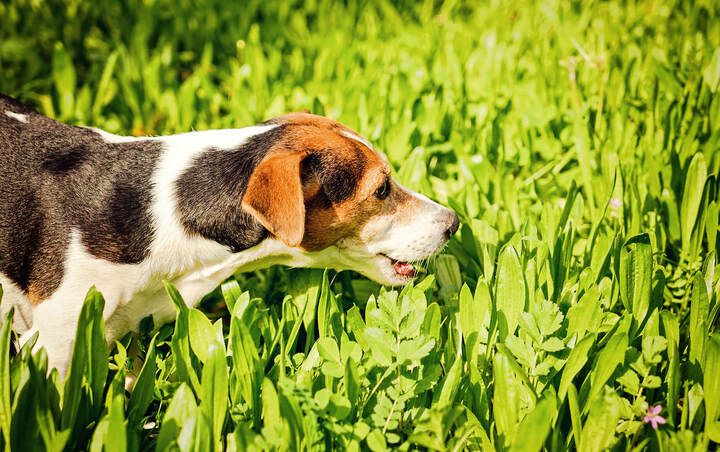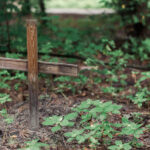As a dog owner, you’ve likely observed your four-legged friend occasionally munching on a patch of grass during their daily walks or backyard explorations. This behavior, often perplexing to many pet parents, raises an important question: Is it safe for dogs to eat grass?
The Grass-Eating Habit: A Common Canine Behavior
First and foremost, it’s important to know that grass-eating is a relatively common behavior among dogs. Experts believe that this habit can be traced back to their wild ancestors, who often consumed plant material as part of their diet. In modern dogs, this behavior persists, although the exact reasons can vary.
Dogs may instinctively eat grass to fulfill a missing part of their diet. While most commercial dog foods are designed to be nutritionally complete, some dogs might still feel the need for more fiber. Grass is a good source of fiber, and eating it can aid in digestion and help regulate bowel movements. However, it’s essential to ensure that a dog’s primary diet is balanced and meets all their nutritional requirements.
Is Eating Grass Safe for Dogs?
While the sight of a dog eating grass might initially cause concern for some pet owners, it’s worth noting that this behavior can have several benefits. Understanding these benefits can help owners appreciate this natural behavior in their dogs.
Natural Dietary Fiber
Grass contains dietary fiber, which is beneficial for a dog’s digestive system. The fiber in grass can aid in digestion, help regulate bowel movements, and ensure smooth passage through the intestines. For dogs that might not get enough fiber from their regular diet, eating grass can be a natural way to supplement this essential nutrient.
Inducing Vomiting to Relieve Discomfort
Some dogs eat grass to induce vomiting when they have an upset stomach or have ingested something that doesn’t agree with them. While this might seem concerning, it can be a natural way for dogs to relieve gastrointestinal discomfort. However, it’s important to monitor this behavior and consult a veterinarian if it becomes frequent, as it might indicate underlying health issues.
Nutrient Absorption
Grass can be a source of essential nutrients that a dog might crave, especially if their regular diet is lacking in certain areas. It contains chlorophyll, potassium, and enzymes that are beneficial for a dog’s health. Chlorophyll, in particular, is known for its natural healing properties and can aid in cleansing the body.
Psychological Satisfaction
Eating grass can provide psychological satisfaction to dogs, especially for those that enjoy the texture or taste. For dogs that spend a lot of time indoors, grazing on grass can also be a stimulating outdoor activity that satisfies their natural foraging instincts.
Natural Instinct Fulfillment
For dogs, engaging in behaviors that are instinctual, such as eating grass, can be mentally stimulating and satisfying. Fulfilling these natural instincts is important for their mental well-being and can contribute to a more balanced and happy temperament.
When to Be Concerned About Your Dog Eating Grass
While it’s generally safe for dogs to eat grass, there are certain situations where this behavior can be a cause for concern. As a responsible pet owner, it’s important to be aware of these signs to ensure the health and well-being of your canine companion.
Frequent and Excessive Grass Eating
If your dog is compulsively eating grass every time they’re outside, or if they seem to prefer grass over their regular dog food, this could be an indication of a dietary deficiency or gastrointestinal upset. It’s important to monitor their eating habits and consider whether their diet is fulfilling all their nutritional needs.
Accompanied by Signs of Illness
Occasional grass eating is usually harmless, but if it’s accompanied by signs of illness, it’s time to take action. Be on the lookout for symptoms such as:
- Frequent Vomiting: While grass can induce vomiting in some cases, frequent vomiting (especially if it occurs without grass eating) can be a sign of a more serious condition.
- Diarrhea: Persistent diarrhea, with or without grass eating, should always be checked by a veterinarian.
- Lethargy: If your dog is less active than usual and showing little interest in activities they usually enjoy.
- Lack of Appetite: Refusal to eat or reduced interest in food can indicate various health issues.
- Signs of Pain or Discomfort: Whining, restlessness, or reluctance to move can suggest that your dog is in pain.
Changes in Stool
Changes in your dog’s stool can be a significant indicator of their health. If you notice undigested grass in their stool or if their stool becomes consistently loose or abnormal, it might be time for a vet visit.
Sudden Changes in Behavior
A sudden increase in grass eating, especially if it’s out of character for your dog, warrants attention. Any abrupt change in behavior should be noted and, if persistent, discussed with your vet.
Consuming Dangerous or Toxic Grass
Not all grass is safe. If your dog consumes grass that has been treated with chemicals like pesticides or fertilizers, they could be at risk for poisoning. Also, certain types of plants and weeds that may resemble grass can be toxic to dogs.
Pica
Pica is a condition where dogs eat things that aren’t food, including grass. If your dog is eating grass and other non-food items, this could be a sign of pica, which often requires professional intervention from a veterinarian or an animal behaviorist.
Final Thoughts
In most cases, a dog eating grass is not a cause for alarm. However, being aware of and responsive to the above signs can help ensure that this common behavior doesn’t indicate a larger health issue. Regular veterinary check-ups and open communication with your vet about your dog’s habits, diet, and behavior are key to maintaining their health and happiness. Remember, each dog is unique, and what’s normal for one may not be for another. When in doubt, it’s always best to consult with a professional.






